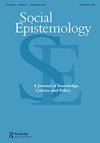自由派的稳定
IF 2
2区 哲学
Q1 HISTORY & PHILOSOPHY OF SCIENCE
引用次数: 0
摘要
摘要在本文中,我认为稳定性是上位制度安排发挥良好作用并证明其主张统治权的有利条件之一。在这种背景下,我证明,将排他性决策权分配给知识渊博的公民的策略的倡导者未能证明,在以多元化为标志的背景下,自由主义的上位论将是稳定的。他们可能会争辩说,自由主义的上位制度将是稳定的,因为上位制度安排比民主决策机构更有能力产生接近共同利益的结果。他们可能会争辩说,自由主义的书信主义将是稳定的,因为有一套共同的精英价值观和思想。此外,他们可以选择两种标准的自由主义策略,如重叠的共识和权宜之计。然而,在所有情况下,自由主义书信体稳定性的论点都没有说服力。本文章由计算机程序翻译,如有差异,请以英文原文为准。
Stability in Liberal Epistocracies
ABSTRACT In this article, I argue that stability is one of the enabling conditions for epistocratic arrangements to function well and justify their claim right to rule. Against this backdrop, I demonstrate that advocates of strategies to allocate exclusive decision-making power to knowledgeable citizens fail to demonstrate that in a context marked by the fact of pluralism, liberal epistocracies will be stable. They could argue that liberal epistocracies will be stable because epistocratic arrangements are better equipped than democratic decision-making bodies to produce outcomes that approximate the common good. They could argue that liberal epistocracies will be stable because there is a shared meritocratic set of values and ideas. Furthermore, they could opt for two standard liberal strategies, such as overlapping consensus and modus vivendi. Yet, in all cases, the argument for the stability of liberal epistocracies is not persuasive.
求助全文
通过发布文献求助,成功后即可免费获取论文全文。
去求助
来源期刊

Social Epistemology
Multiple-
CiteScore
2.60
自引率
17.60%
发文量
60
期刊介绍:
Social Epistemology provides a forum for philosophical and social scientific enquiry that incorporates the work of scholars from a variety of disciplines who share a concern with the production, assessment and validation of knowledge. The journal covers both empirical research into the origination and transmission of knowledge and normative considerations which arise as such research is implemented, serving as a guide for directing contemporary knowledge enterprises. Social Epistemology publishes "exchanges" which are the collective product of several contributors and take the form of critical syntheses, open peer commentaries interviews, applications, provocations, reviews and responses
 求助内容:
求助内容: 应助结果提醒方式:
应助结果提醒方式:


